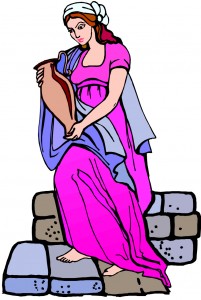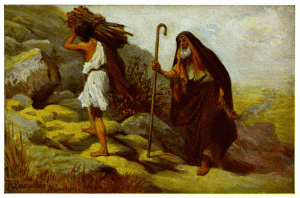Genesis 26:1–29, There was a famine in the land. At the well of Lachai-roi (or “the well of the Living One seeing me,” Gen 24:62), Isaac was fruitful. There he met his wife while in communion with YHVH (24:62–64).
Isaac also dwelt there for 20 years where he entreated YHVH because of Rebekah’s barrenness (25:21), and YHVH answered Isaac’s prayer and Rebekah gave birth to twins (25:22ff). But because of famine in the land, Isaac felt compelled to leave Canaan to seek relief in Egypt following the earlier footsteps of his father, Abraham.
Is it wise to rely on “Egypt” (a metaphor for the world) for our sustenance instead of trusting YHVH and believing that where he has planted us and blessed us is where we should stay?
While en route to Egypt YHVH, gracefully redirected Isaac away from Egypt instructing him rather to sojourn in Gerar (temporarily) where he would continue to bless him and his posterity (26:2–4). Isaac obeyed YHVH — more or less. Isaac ended up in Gerar located on the border between Canaan and Egypt and dwelt there a long time (not temporarily as YHVH had instructed him, 26:6, 8). Instead of fully obeying YHVH, it was as if Isaac was hedging his bet between faith and fear, between Canaan, the land of promise, and Egypt, the land of comfort for the flesh man.
How often do we halt between two opinions and compromise between YHVH’s will and our own in matters where he has given us clear direction?
This place of spiritual indecision and weakness put Isaac in a compromising situation (26:7). He felt compelled to lie about his wife, thus repeating the sin of his father (Gen 20:1–2).
Compromised obedience puts us in compromising situations where in order to “save our skin” we often have to compromise our values. Though Isaac was out of YHVH’s will, YHVH was still faithful to keep his promises he had made to Isaac earlier (Gen 26:3–4). Isaac was blessed one hundred fold in his wealth (Gen 26:12–14).
Despite YHVH’s blessings, Isaac’s labors were not without difficulty and opposition from an enemy who was intent upon stealing his water wells, which were rightfully his (Gen 26:12–15). In the arid regions of the Holy Land, wells are essential for survival and prosperity.
Wells are a spiritual metaphor for salvation, life, abundance and truth — things the enemy is intent on taking from us (in this light, consider Isa 12:3; 55:1–3; Ps 36:9; John 4:7–14; 7:37–39; 10:10).








